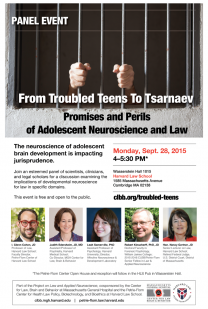The neuroscience of adolescent brain development has had increasing impact on American jurisprudence. The U.S. Supreme Court relied on this neuroscience in Roper v. Simmons (2005) in barring execution for capital crimes committed as a juvenile and in Miller v. Alabama (2012) in holding that mandatory life without possibility of parole for juveniles is also unconstitutional.
On Monday, September 28, 2015, CLBB and the Petrie-Flom Center assembled a panel of developmental scientists, clinicians, and legal scholars for a panel discussion examining the implications of developmental neuroscience for law in specific domains including death penalty mitigation for young adults over age 18 such as the Tsarnaev case, a developmentally informed view of Miranda and Competence to Stand Trial for juveniles, trial of youth as adults, and conditions of confinement in juvenile and adult incarceration.
The panel discussed the promises and perils for constitutional jurisprudence, legal and public policy reform, and trial practice of relying upon a complex body of science as it emerges. Scroll down to view complete video from the event.
This event is part of the Project on Law and Applied Neuroscience, a collaboration between the Center for Law, Brain & Behavior at Massachusetts General Hospital and the Petrie-Flom Center for Health Law Policy, Biotechnology, and Bioethics at Harvard Law School.
The panel took place on Monday, September 28, 2015 from 4-5:30pm at Harvard Law School.
Panelists:
 Judge Nancy Gertner (ret.), Senior Lecturer on Law, Harvard Law School; Faculty, Center for Law, Brain and Behavior
Judge Nancy Gertner (ret.), Senior Lecturer on Law, Harvard Law School; Faculty, Center for Law, Brain and Behavior
 Robert Kinscherff, PhD, JD, 2015-2016 Senior Fellow in Law & Applied Neuroscience, Center for Law, Brain & Behavior and Petrie-Flom Center; Faculty in the Doctoral Program in Clinical Psychology and Associate Vice President for Community Engagement, William James College; Senior Associate, National Center for Mental Health and Juvenile Justice; Faculty, Center for Law, Brain and Behavior
Robert Kinscherff, PhD, JD, 2015-2016 Senior Fellow in Law & Applied Neuroscience, Center for Law, Brain & Behavior and Petrie-Flom Center; Faculty in the Doctoral Program in Clinical Psychology and Associate Vice President for Community Engagement, William James College; Senior Associate, National Center for Mental Health and Juvenile Justice; Faculty, Center for Law, Brain and Behavior Leah Somerville, PhD, Assistant Professor of Psychology, Harvard University; Faculty, Center for Law, Brain and Behavior
Leah Somerville, PhD, Assistant Professor of Psychology, Harvard University; Faculty, Center for Law, Brain and Behavior Introductions + Q&A: I. Glenn Cohen, JD, Professor of Law, Harvard Law School, and Faculty Director, Petrie-Flom Center of Harvard Law School
Introductions + Q&A: I. Glenn Cohen, JD, Professor of Law, Harvard Law School, and Faculty Director, Petrie-Flom Center of Harvard Law SchoolModerat
 or: Judith G. Edersheim, JD, MD, Co-Director, Center for Law, Brain and Behavior; Assistant Clinical Professor of Psychiatry, Harvard Medical School; Attending Psychiatrist, Department of Psychiatry, Massachusetts General Hospital
or: Judith G. Edersheim, JD, MD, Co-Director, Center for Law, Brain and Behavior; Assistant Clinical Professor of Psychiatry, Harvard Medical School; Attending Psychiatrist, Department of Psychiatry, Massachusetts General HospitalWatch video of the entire event below, or explore past events on juvenile justice issues on CLBB’s Vimeo channel.
Related Content
For more on the neuroscience of the adolescent brain, criminal sentencing, and the Tsarnaev case, check out these pieces from our panelists.
- Judith G. Edersheim, “Could Tsarnaev Argue, ‘My Immature, Pot-Impaired Brain Made Me Do It’?“, WBUR’s CommonHealth, January 9, 2015
- Panel discussion with Judith G. Edersheim, “How Will Brain Science Affect The Tsarnaev Trial?”, WBUR, January 12, 2015
- Judge Nancy Gertner, “We All Chose Death for Tsarnaev“, The Boston Globe, May 15, 2015 (login required)
-
Leah Somerville, “The Neuroscience”, part of the MGH Center for Law, Brain and Behavior public symposium, “Juvenile Justice & the Adolescent Brain: Is Healthy Neurodevelopment a Civil Right?“, March 12, 2015




